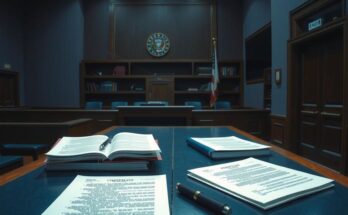Tunisia’s recent presidential election, marked by significant political suppression, sees incumbent President Kais Saied facing minimal opposition due to the imprisonment and exclusion of major rivals. The election highlights concerns over the state of democracy in Tunisia since the Arab Spring, as Saied consolidates power and key opposition figures remain silenced amid economic challenges and low voter turnout. The election reflects a nation grappling with its democratic aspirations while facing a politically repressive environment.
In Tunisia, the recent presidential election highlighted significant political challenges as incumbent President Kais Saied faces minimal opposition. Major political figures are either imprisoned or excluded from the competition, leading many Tunisians to anticipate Saied’s victory without any real contest. This election follows a tumultuous political landscape since the 2011 Arab Spring, with Tunisia once regarded as a beacon of democratic progress within a region marked by instability. However, disillusionment has grown as successive administrations failed to address the pressing economic struggles and internal conflicts. Saied’s first term was marked by a wave of support stemming from his anti-establishment appeal, stemming from a perceived need for socio-political change. Upon taking office, he positioned himself as a political outsider committed to revitalizing Tunisia. Yet, his administration, characterized by authoritarian tendencies since the political upheaval of July 2021, has seen a consolidation of power that has alarmed pro-democracy advocates. Many of Saied’s critics have been arrested under dubious legal frameworks, fostering a climate of fear and stifling opposition voices. This latest election was a critical reflection of the current state of democracy in Tunisia. While Saied’s loyal base appears steadfast, the absence of credible challengers is concerning. Only three candidates were permitted to run: Saied himself, Zouhair Maghzaoui, and Ayachi Zammel, with the latter’s candidacy clouded by legal controversies and past allegiances to Saied. The leading opposition figures, such as Rached Ghannouchi, founder of the Ennahda party, remain jailed, leading many to question the integrity of the electoral process. In an environment marked by widespread political apathy, fewer citizens participated in recent elections, reflecting growing discontent and lack of confidence in the political system. Economic issues, including high unemployment rates—particularly affecting the youth—and reliance on international financial aid, impede the political landscape further. Saied’s policies, criticized for their vagueness, have not provided the much-needed economic relief. Internationally, Tunisia’s geopolitical stance continues to evolve under Saied’s leadership. While maintaining relations with traditional Western allies, Saied has sought to redefine Tunisia’s interactions on the global stage, leaning towards partnerships that emphasize regional sovereignty and economic autonomy. Nonetheless, European leaders commend Saied’s approach to migration management, illustrating a complex and often contradictory diplomatic narrative. In summation, Tunisia stands at a crossroads where the outcome of the latest presidential election may ultimately reinforce existing power structures rather than facilitate the democratic aspirations of its people. The path forward remains uncertain, as socio-economic challenges and political repression continue to shape the nation’s landscape.
The political landscape in Tunisia has been tumultuous since the 2011 Arab Spring, which initially positioned the country as a success story in the region. Following the ousting of President Zine El Abidine Ben Ali, Tunisia adopted a new democratic constitution and earned international recognition for its civil society’s role in fostering political compromise. However, subsequent governments have struggled with economic hardships and internal strife, leading to a rise in authoritarian practices. The recent presidential election serves as a crucial indicator of the current state of Tunisia’s democracy, as the incumbent president, Kais Saied, has consolidated power through controversial means, including the imprisonment of opposition figures and restrictions on political activity.
The recent presidential election in Tunisia reflects the concerning reality of diminished political plurality, as the incumbent President Kais Saied faces little real opposition. His significant consolidation of power, amid a backdrop of economic strife and increased repression, poses profound implications for the future of Tunisia’s democracy. With key opposition figures silenced and widespread disillusionment among the populace, the electoral process is perceived by many as lacking legitimacy, raising significant questions about the trajectory of governance and civil rights in Tunisia.
Original Source: www.euronews.com




